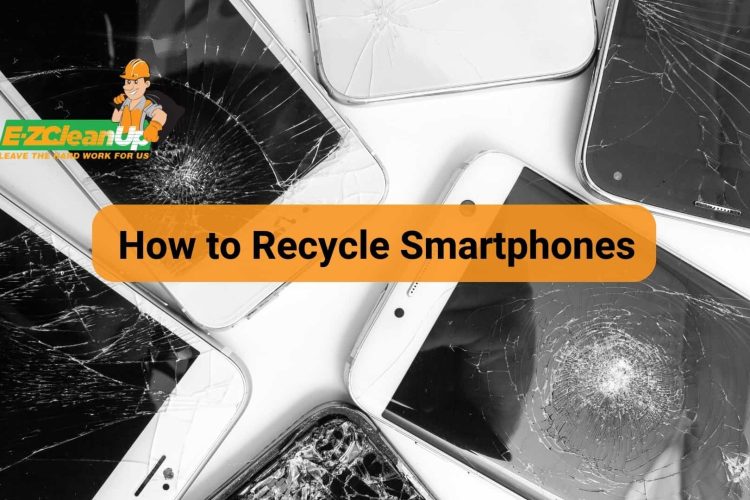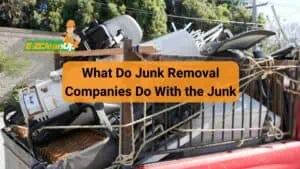To recycle smartphones, backup data, then factory reset and remove SIM and memory cards. Choose local recycling centers, manufacturer take-back programs, or retailer initiatives for eco-friendly disposal.
This process safeguards the environment from hazardous materials in phones and promotes sustainable practices. Learn more about how to recycle smartphones below.
Recycling Options for Smartphones
Tossing your phone in the trash? That’s a no-go. It’s e-waste, a major environmental threat. Your old phone in a landfill leaks toxic stuff – lead, mercury, arsenic – into the ground. This not only harms the soil and water but also the wildlife and, yes, us humans. We’re talking serious long-term damage here.
So, what are your best options for recycling smartphones? Here are some:
Local Recycling Programs
Many cities and towns have designated recycling centers or special events for collecting e-waste. These programs ensure that your device is either refurbished for further use or recycled in an environmentally friendly manner. To find a local recycling program, check your city or town’s government website for information on e-waste recycling locations and schedules.
Manufacturer Take-Back Programs
Several smartphone manufacturers run take-back programs. These allow consumers to return their old devices directly to the company for recycling. These programs are part of the manufacturer’s efforts to reduce e-waste and recover valuable materials from old devices.
Participants in these programs can often ship their old phones for free. Check with your device’s manufacturer for specific details on their take-back program and how to participate.
Retailer Recycling Initiatives
Many electronics retailers offer recycling services for smartphones and other electronic devices. These programs are usually free and convenient as many people buy their new devices from these same retailers.
Some retailers also offer incentives, such as discounts on new purchases, when you recycle your old device with them. It’s a great way to ensure your old smartphone is disposed of responsibly while possibly getting something in return.
Components of Smartphones That Can Be Recycled
Here are the crucial components of smartphones you need to look into when considering recycling:
Battery Disposal and Recycling
Smartphone batteries, typically lithium-ion or lithium-polymer, contain heavy metals like zinc, copper, and cobalt, which are hazardous to the environment. According to federal law, these batteries must be recycled to prevent toxic chemicals from being released.
The Mercury-Containing and Rechargeable Battery Management Act of 1996 mandates the recycling of such batteries. Most states, except California, allow the disposal of household batteries in standard recycle bins, but specialized recycling is required for smartphone batteries to manage the spread of toxic chemicals.
Metals and Plastics in Smartphones
Smartphones are composed of a variety of materials, including precious metals and plastics. Significant quantities of silver, gold, and palladium exist in one ton of cell phones. Components like printed circuit boards (PCBs), liquid crystal displays (LCDs), cameras, flexible substrates and motors, speakers, and microphones are made from hazardous, precious, and base elements.
PCBs contain lead, arsenic, gold, silver, copper, aluminum, and other base metals. LCDs contain gold, silver, arsenic, barium, copper, and other base metals. When placed in landfills, these materials can pollute the air and contaminate soil and drinking water. Recycling these materials saves energy and resources that would otherwise be required to mine or manufacture them.
Special Handling for Hazardous Components
The hazardous components in smartphones, such as lead, cadmium, mercury, and other toxic elements, require special handling during recycling. These elements, found in various electronic components, pose significant health and environmental risks.
- Lead: It is used in metal joining and radiation shielding in CRTs and printed wiring boards, and it can cause neurological, blood, and kidney damage.
- Mercury: It is used in batteries and switches and can cause long-term brain damage and other neurological effects.
- Cadmium: This is found in batteries and blue/green phosphor emitters and can cause acute and chronic damage to the kidneys.
- Plastics, including those containing PVC and BFRs: These are used in casings and cable coatings, and they can be developmental toxins, reproductive toxins, endocrine disruptors, and carcinogens when burned.
The disposal and recycling of these components require strict adherence to environmental protection guidelines to prevent the release of these toxic substances into the environment.
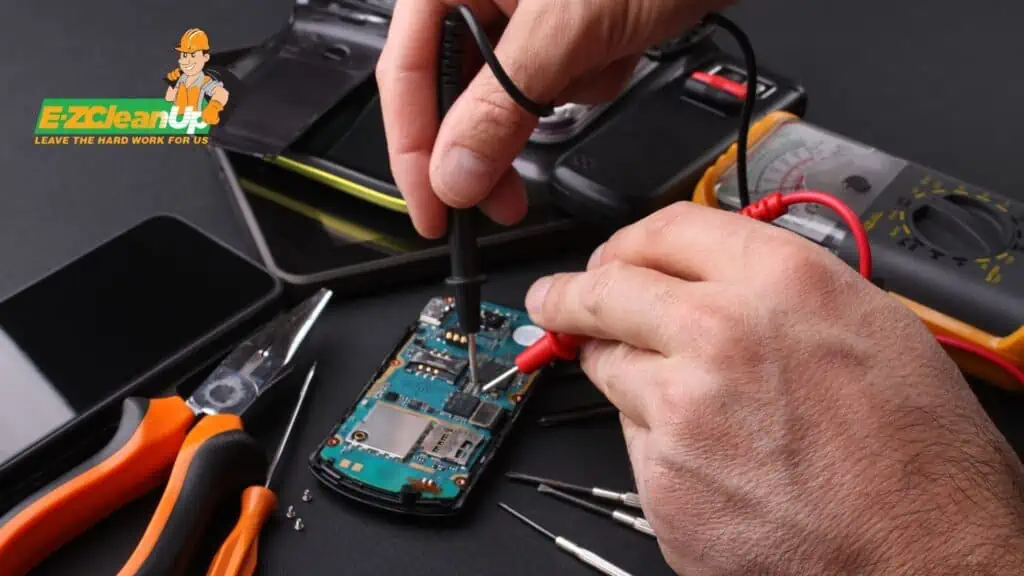
Preparing Smartphones for Recycling
Before recycling your smartphone, it’s essential to safeguard your personal information. The first step is a complete data backup. This can be done by saving your data to a cloud service or your computer. Google, Android, and Apple phones offer easy backup solutions.
Once backed up, the next crucial step is a factory reset. This erases all data, including personal photos, financial information, and account login details, from your device. It’s vital for protecting your privacy; as recycling starts, the data cannot be retrieved.
However, be aware that some older smartphones might still retain partial data even after a reset, so using a certified data erasure service offered by some recycling companies is recommended for additional security.
Removing SIM and Memory Cards
Removing SIM and memory cards from your phone is a non-negotiable step in the recycling process. These cards may contain sensitive personal information. Removing them ensures that your data remains secure and is not accessible to others after recycling. Properly destroying or securely storing these cards is crucial to prevent any unauthorized access to your personal data.
Sorting Based on Condition
When recycling smartphones, it’s helpful to sort them based on their condition. Functional phones can often be refurbished and reused. On the other hand, phones that are beyond repair should be directed to recycling facilities where they can be broken down safely and valuable materials can be recovered.
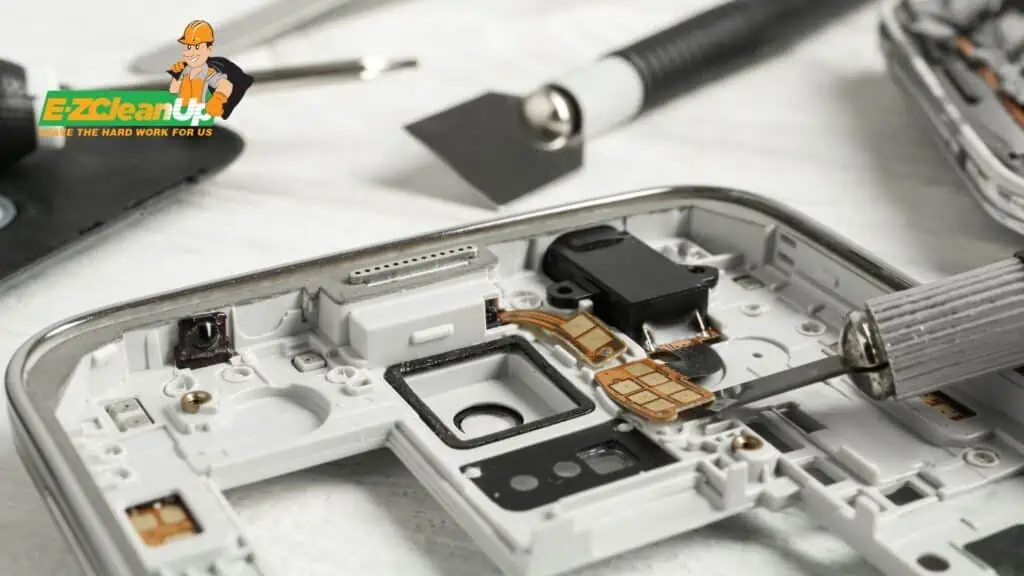
Challenges and Solutions in Smartphone Recycling
The recycling of smartphones faces several challenges. One major barrier is the technical difficulty in collecting waste efficiently. Effective recycling requires significant organization and planning.
Another challenge is consumer skepticism regarding the performance of reconditioned phones, which can hinder the market for recycled products. Additionally, the prevalent consumer culture, driven by the constant marketing of new products, creates a resistance to recycling initiatives.
This consumerism culture is at odds with efforts to promote environmental sustainability and opposes the economic model where manufacturers encourage consumers to frequently replace their phones with newer models.
Innovations in Recycling Technology
Recent years have seen remarkable innovations in recycling technology that promise to enhance the efficiency and effectiveness of smartphone recycling. For instance, new methods are being developed for the sustainable recycling of plastics, which include the following:
- PureCycle Technology: This recycles polypropylene into reusable resin.
- Internet of Things (IoT) technology: This is also being applied to streamline recycling routes, using sensor hardware in garbage disposal units to gather data on recycling practices.
- RFID (Radio Frequency Identification) technology: Advancements in the technology are expected to improve recycling systems by embedding circuits in products that store information on how to recycle them correctly.
These technologies could revolutionize the recycling process, making it more efficient and less prone to contamination.
Role of Consumers in Promoting Recycling
Consumers play a critical role in promoting the recycling of smartphones. Their choices and behaviors significantly impact the success of recycling programs. Increasing consumer awareness and participation in recycling initiatives can drive the market for reconditioned phones.
Additionally, shifting consumer preferences towards sustainable and environmentally friendly products can influence manufacturers and operators to focus more on recycling and reconditioning instead of constantly pushing new products.
By valuing the durability and recyclability of smartphones, consumers can help steer the industry toward more sustainable practices, aligning with environmental goals.
Maximizing the Lifespan of Smartphones
To maximize a smartphone’s lifespan, consumers should adopt good charging habits, like avoiding overnight charging and keeping the battery charged between 40% and 80%. It’s better to charge in brief intervals rather than from 0 to 100% in one go.
Optimizing battery usage, updating to the latest software, using physical protection like durable cases and screen protectors, and using the phone in recommended temperatures are also essential. These practices not only prolong the phone’s life but also reduce the need for frequent replacements, thereby contributing to sustainability.
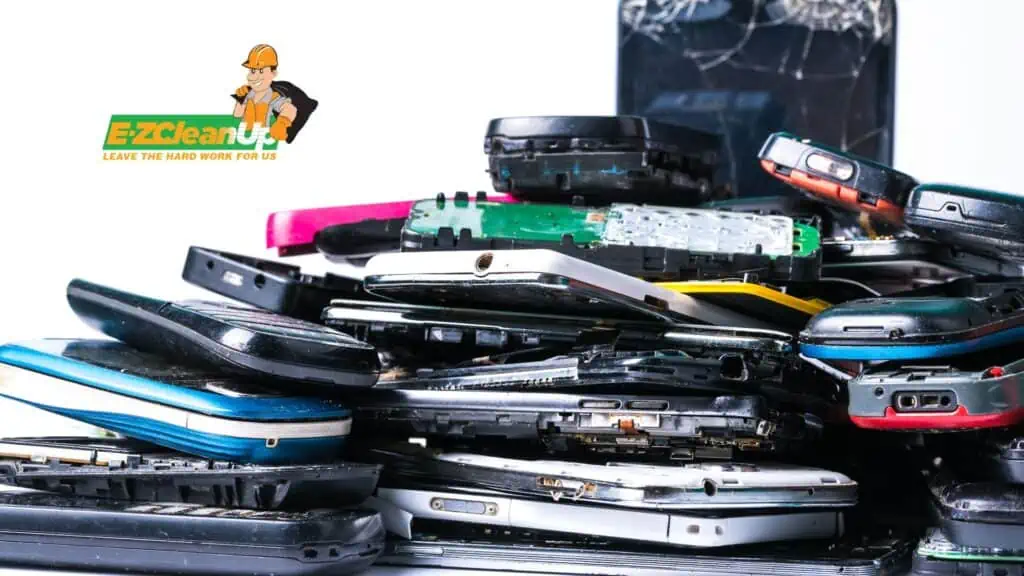
Junk Recycling Made Easy with EZ CleanUp
As you explore ways to recycle your smartphones responsibly, EZ CleanUp emerges as a standout choice for eco-conscious consumers in Philadelphia and surrounding areas. Specializing in junk removal, including electronic waste, we follow the principle of affordable, eco-friendly, and swift service. So, if you have a big cleanout going on, we can take your junk, including your old or busted smartphones.
Our team, seasoned in handling various types of waste, ensures that your old smartphones and other junk are recycled or disposed of in an environmentally responsible manner. With transparent pricing and no hidden fees, we make the process budget-friendly. Plus, if your items hold resale or recycling value, we offer credit back to you.
Need immediate assistance? Our flexible scheduling and same-day service options cater to your convenience. Choose EZ CleanUp for a hassle-free, green solution to your smartphone recycling needs. Call us today for a free quote.

